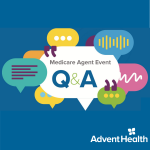Your Spring Allergy Survival Guide
Central Florida Health News, Volume 12, Issue 1 by SEAN JARVIS
If there is any doubt that spring is here, those of us in Central Florida need to do little more than look

Cecila Arango, MD – Family Medicine
outside. That yellow cast over cars, lawns, sidewalks, and driveways isn’t sunshine. It’s pollen. And for many people, it heralds the beginning of the annual battle with spring allergies.
If you are one of the more than 50 million Americans who experience seasonal allergies, you are familiar with the sneezing, runny nose, and itchy eyes.
According to Dr. Stephanie Phan, a pediatric specialist with Bond Clinic who works in the Davenport office, allergy symptoms occur when a person’s immune system treats pollen particles as foreign invaders and releases chemicals, such as histamine, causing allergy symptoms.
This reaction can occur at any age, though typically doesn’t occur until at least 2 years of age.
What Triggers Seasonal Allergies?
“Pollen from trees, plants, and grass are the most common culprits,” Phan says, “but other allergens include mold, dust, and dander.”
For instance, as the weather warms, mold that grows in leaf piles can become airborne and trigger symptoms. Likewise, as histamines are released, they increase blood flow and cause inflammation. This triggers other chemicals to react, causing the sniffling, sneezing, coughing, and runny eyes that make up allergy sufferers’ symptoms.

Stephanie Phan, DO – Pediatrics
Different allergens are released at different times of the year and in different parts of the country. Therefore, you may have severe allergies in the spring but not in the fall. “During April to October, the most common allergens are pollen, weed, and grass,” says Dr. Cecilia Arango, a family medicine physician at Bond Clinic. “To know what kind of allergens you are susceptible to, an allergy test would need to be done. Some could be done by blood or by measuring skin reaction.”
Limiting Exposure
Once you have figured out what you are allergic to, you can use this information to try and mitigate exposure.
“Keep your windows closed and stay indoors during times when the pollen count is high,” Phan explains. If your child is suffering from allergies, make sure to have them wash their hands, change their clothes, or take a shower after playing outdoors.
“Washing bedding frequently and using an air filtration system in the home that reduces airborne allergens may also help,” she says.
If your allergies are to a particular tree or weed pollen, removing these plants from your landscaping will be beneficial.
Arango suggests boosting your immune system with probiotics, vitamin C, and local honey. She also recommends a humidifier, mint scent, and a cold shower for additional relief.
Nasal Irrigation for Relief
Sinus rinsing can help to remove dust, pollen, and allergens from your nasal passages. These irrigation devices are commonly called Neti Pots and are used with a saline or saltwater solution.
“There is some evidence to support the use of nasal irrigation as a safe and effective way to help with allergies if performed correctly,” Phan says. “However, nasal irrigation does carry the risk for potential fatal infections if contaminated water or irrigation devices are used.” Therefore, it is essential to use distilled or sterile water.
Phan cautions the importance of consulting your pediatrician if you are considering using a Netti Pot to help with a child’s allergies and adds that “very young children may not tolerate this technique.”
Medication to Alleviate Symptoms
According to Phan, “Both over-the-counter and prescription oral, nasal, and eye antihistamines, as well as steroid nasal sprays, are all effective options for treating seasonal allergies. Antihistamines and nasal corticosteroids are common treatments and safe to use in children.” To expand on this, Arango says there are OTC medications like Zyrtec for children, Claritin for children, and Benadryl for children, although the last one might cause drowsiness.
Whether it’s an OTC antihistamine, nasal spray, or both, keep track of what works and what doesn’t. Then, if you’re still suffering, it may be time to see an allergy specialist.
While taking a pill every day for your allergies may not sound fun, it is safe to do so. “However, if symptoms do not improve on multiple medications or your child is requiring prolonged use of pharmacotherapy, then your pediatrician may recommend seeing an allergist to provide other treatment options such as immunotherapy,” Phan explains.
Immunotherapy for Seasonal Allergies
Immunotherapy is a treatment for seasonal allergies that involves gradually introducing the allergen to your body. Your immune system will become less sensitive to the allergen through these incremental increases. This may cause the production of a “blocking” antibody, which will reduce symptoms.
“Immunotherapy can be a very effective treatment option for a child and may reduce the need for daily medications and improve their overall quality of life,” Phan says.
Before beginning immunotherapy treatment, the allergist will work with the patient to identify trigger factors that produce the allergic reactions. They also may run skin and blood tests to confirm which specific allergens affect you.
Original article may be found here.
 Treating you well since 1948
Treating you well since 1948 


